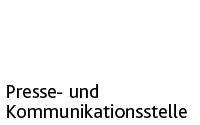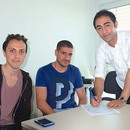The help goes on
Following the end of the emergency shelter on Haardter Berg, Universität Siegen is continuing its efforts for refugees. The project "Refugees Helping Refugees" supports them in getting a college degree.
Mohammed Ali Anis comes from Aleppo, Syria and came to Germany last October. His first stop back then: the former emergency shelter for refugees in the athletic hall at Universität Siegen. Three-fourths of a year later, the 22-year-old has traded the army cot in the gym for a room in the student dorm. He has been accepted for the computer science program at the university. He has just finished the required German course. Mohammed Ali Anis has come so far so fast thanks to the "Refugees Helping Refugees" program.
Located in the Department of "German as a Foreign Language", this project helps refugees start a degree program at Uni Siegen – and to finish it successfully. The special feature: The employees themselves have a history as refugees and thus know the worries of their "clients" very well. Majdi Bido, for example: The 30-year-old also comes from Syria but has already been living in Germany for two years. She now speaks fluent German and studies business IT at Uni Siegen. As an undergraduate assistant, he helps the project managers advise refugees in all matters concerning their course of study.
What can I study, and what do I want to study? How does the admission process work? How do I get a spot in the dorm and health insurance? And how can I pay for my studies? In all these matters, Majdi Bido long ago became an expert and knows all about the necessary forms. "The 'officialese' of the forms is sometimes really difficult to understand", he says. "A lot of people don't know what to do with some of the terms. For instance, they don't know what a resident registration certificate is or a notarized copy – and where to get one". Majdi Bido and his colleagues provide support for trips to government offices, organize informational events, and clarify cultural differences.
"Particularly the cultural dimension is enormously important", says Christian Gerhus, Project Manager of the Department of "German as a Foreign Language". Those who come from the same country as the refugees and share their culture, can simply explain the rules of the game in Germany better: "For example, a 'no' in the burocratic process here is really a 'no' – and not a basis for negotiation. Our employees can explain and convey such differences quite differently than I could". After all, the undergraduate assistants have already met and mastered the challenges of successful integration in Germany themselves. "For their countrymen, they thus act as models", says Gerhus.
Majdi Bido does not feel quite comfortable in the role of model. He just wants to help. He did that in his old job in his old life in Syria: For six years, he worked for the refugee relief agency of the United Nations. Now, being able to help in Germany as well is "a matter of great satisfaction" for Bido. In the emergency shelter for refugees in the university gymnasium, he already worked as an honorary interpreter.
Starting in July 2015, Universität Siegen worked with the city to take in refugees in this emergency shelter: a total of 2393 people from 33 countries. In the context of various projects, the students have provided support to the refugees in nearly every aspect of daily life; in total, the university created 50 jobs for undergraduate assistants. The "Refugees Helping Refugees" project developed from this commitment. It is financed by the German Academic Exchange Service, or DAAD (Deutscher Akademischer Austauschdienst).
Mohammed Ali Anis is one of a total of about 60 refugees currently enrolled at Uni Siegen. He is "more than happy" about the opportunity to continue his IT studies. The 22-year-old sees his future in Germany: "After getting my degree, I will look for work here. In Syria, I experienced a lot of terrible things".


